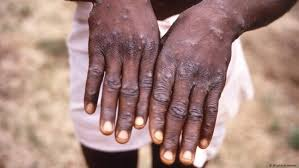Africa’s Mpox Outbreak: A Deep Dive
Africa’s Mpox Outbreak: The Mpox outbreak, formerly known as Monkeypox, has raised significant public health concerns across Africa. While previously considered a relatively rare zoonotic disease, recent years have seen a surge in cases across various African nations. This article delves into the outbreak, exploring its origins, transmission, the public health response, and the implications for the future.
Table of Contents
#Understanding Mpox: Origins and Background
What is Mpox?
The virus responsible for Mpox belongs to the Orthopoxvirus genus, which also includes the viruses that cause smallpox and cowpox. While smallpox has been eradicated, Mpox remains endemic in parts of Africa, particularly in Central and West Africa.
The disease was first identified in laboratory monkeys in 1958, which led to its original name, “Monkeypox.” However, monkeys are not the primary reservoir; the virus is more commonly found in rodents, such as squirrels and rats. The first human case was recorded in the Democratic Republic of the Congo (DRC) in 1970, and since then, sporadic cases have been reported across the continent.

How Mpox Spreads
Human-to-human transmission can occur through close contact, including respiratory droplets, physical contact with contaminated materials, or skin-to-skin contact with an infected person. Although the disease is less contagious than smallpox, its potential to spread in populations with limited immunity makes it a significant public health concern.
The virus’s incubation period ranges from 5 to 21 days, with symptoms including fever, headache, muscle aches, and a distinctive rash that progresses from macules to papules, vesicles, pustules, and finally crusts. The disease can be fatal, particularly in children and immunocompromised individuals, with mortality rates varying depending on the strain and the region.
#The Surge of Mpox Cases in Africa
Factors Contributing to the Outbreak
In recent years, Africa has witnessed a worrying increase in Mpox cases.
- Deforestation and Human Encroachment: As humans encroach on wildlife habitats, the likelihood of zoonotic diseases like Mpox spilling over to human populations increases. The loss of natural habitats forces animals into closer contact with humans, facilitating the transmission of the virus.
- Weak Health Infrastructure: Many African countries face challenges related to inadequate health infrastructure, limited access to healthcare, and insufficient disease surveillance systems. These factors contribute to delayed detection and response to Mpox outbreaks, allowing the virus to spread more widely.
- Climate Change: Changing environmental conditions can influence the distribution and behavior of wildlife reservoirs, potentially increasing the risk of zoonotic disease outbreaks. Climate change may also impact human behavior, such as migration and agricultural practices, further increasing the risk of exposure to infected animals.

Regional Hotspots
While Mpox has been reported in several African countries, certain regions have been particularly hard-hit. The DRC, Nigeria, and the Central African Republic have seen significant outbreaks in recent years.
- Democratic Republic of the Congo (DRC): The DRC has long been considered the epicenter of Mpox, with the majority of reported cases. The country’s dense forests, where the virus is endemic in wildlife, combined with limited healthcare access, make it particularly vulnerable to outbreaks.
- Nigeria: Since 2017, Nigeria has experienced a resurgence of Mpox, with numerous cases reported across the country. The Nigerian outbreak has raised concerns about the potential for international spread, as cases have been exported to other countries through travelers.
#Public Health Response: Challenges and Strategies
Surveillance and Detection
Effective surveillance is crucial for controlling Mpox outbreaks. However, in many African countries, surveillance systems are underdeveloped or overwhelmed by other health challenges. The reliance on clinical diagnosis, rather than laboratory confirmation, can lead to underreporting or misdiagnosis of cases.
Vaccination and Treatment
Currently, there is no specific treatment for Mpox, and care is primarily supportive. However, the smallpox vaccine has been shown to provide cross-protection against Mpox, reducing the severity of the disease in those who have been vaccinated. In some regions, targeted vaccination campaigns have been implemented to control outbreaks, particularly among healthcare workers and other high-risk groups.

Community Engagement and Education
Public awareness and education are critical components of the Mpox response. Misinformation, stigma, and fear can hinder efforts to control the disease, leading to delays in seeking treatment or reluctance to report cases. Community engagement initiatives that involve local leaders, healthcare workers, and community organizations are essential for building trust and promoting accurate information about the disease.
#Implications for the Future: Lessons and Opportunities
Strengthening Health Systems
The Mpox outbreak in Africa underscores the need for stronger health systems capable of responding to emerging infectious diseases. Investment in healthcare infrastructure, workforce development, and disease surveillance is essential for improving the continent’s capacity to manage future outbreaks. Strengthening primary healthcare systems, in particular, can enhance the early detection and treatment of diseases like Mpox, reducing their impact on communities.
Global Collaboration
Mpox is not just a regional issue; it has global implications. The recent export of cases to other continents highlights the importance of international collaboration in monitoring and controlling the disease. Global health organizations, governments, and research institutions must work together to support affected countries, share data, and develop effective interventions.
Research and Innovation
Ongoing research into Mpox, including its transmission dynamics, animal reservoirs, and potential treatments, is crucial for developing more effective strategies to combat the disease. Innovations in vaccine development, diagnostics, and treatment options will play a key role in controlling Mpox and preventing future outbreaks.
indianfastearning.comindianfastearning.com
#Conclusion: A Call to Action
The Mpox outbreak in Africa represents a significant public health challenge, but it also offers an opportunity for the global community to come together in addressing a shared threat. By strengthening health systems, enhancing surveillance, investing in research, and fostering international collaboration, we can better manage Mpox and reduce the risk of future outbreaks.
www.utube.comwww.utube.com







